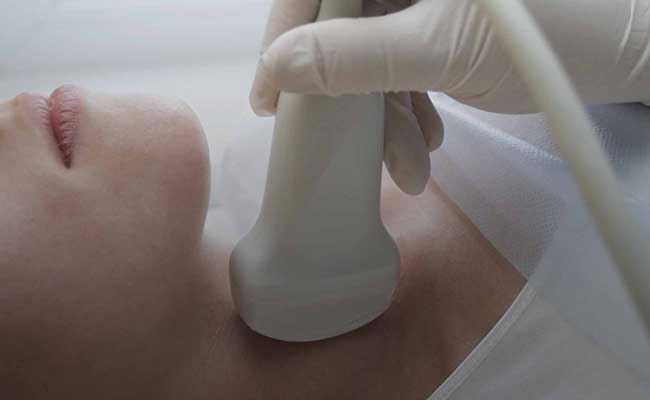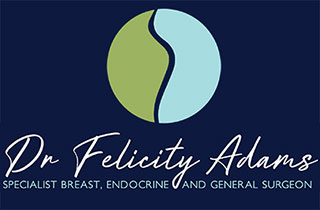Thyroidectomy
What is your thyroid gland?
The thyroid gland is butterfly shaped organ which sits in the lower part of your neck. It lies adjacent to your wind and food pipes. It is divided into two halves or lobes; left and right. Your thyroid secretes thyroid hormone which is required all throughout your body to carry out basic bodily functions.
What is a thyroidectomy and why do I need one?
A thyroidectomy is removal of the entire gland (total thyroidectomy) or one half (lobectomy or hemithyroidectomy).
Dr Adams may recommend surgery for
- concern about cancer within a nodule
- goitres or large glands which are extending behind the breast bone
- thyroid glands causing symptoms such as trouble swallowing or breathing
- overactive thyroids due to Graves disease

What tests might Dr Adams order prior to deciding on the need for surgery?
Evaluation often requires :
- Blood tests – to check on how the gland is functioning and if there are any autoimmune conditions potentially affecting the thyroid
- Ultrasound scan – to assess the size of the gland and any nodules within it
- Needle biopsy (FNA) – is often required of one/more thyroid nodules
- CT scan – is sometimes required to assess if the thyroid is pressing on any important surrounding structures
Do I need a hemi thyroidectomy or a total thyroidectomy?
This will be carefully evaluated by Dr Adams and discussed with you at your consultation.
Concern about cancer within the thyroid can often be initially treated with a hemithyroidectomy as long as the nodule is small. This procedure means that hormone replacement following surgery is rarely required and the other operative risks are reduced. If the nodule is confirmed to be cancer on the microscope test result (histology) of the initial surgery sometimes a recommendation for completion thyroidectomy or removal of the other half of the gland is made. This result takes a few days to come back so is performed at a second surgery.
Goitres are usually treated with a total thyroidectomy as they are usually bilateral but depending on your thyroid and circumstances occasionally hemithyroidectomy will be all that is required. Graves hyperthyroidism (when treated surgically) is always treated with total thyroidectomy.
What are the risks of thyroid surgery?
Thyroid surgery is performed through an incision in the bottom of the neck. The size of this incision and the scar it leaves depends on the size of the gland being removed. Dr Adams is very conscious of the cosmetic outcome from surgery and uses the smallest possible cut required to perform the operation safely. For many patients this can be hidden in a natural crease and by six to twelve months leaves a faint white line which is not obvious. Other patients due to their skin type are prone to hypertrophic or keloid scarring and their scars will be more obvious. Please talk to Dr Adams if you have concerns about scarring before your surgery.
Other more serious but less common risks are:
Bleeding – All bleeding apparent during the initial surgery is stopped before finishing your surgery. Occasionally this occurs after the operation is complete and requires and return to the operating room to remove the blood and stop the bleeding (<1%)
Damage to the nerves to the voice box – The recurrent laryngeal nerves travel right next to the thyroid and are at risk of damage during the surgery. Nerve damage can lead to hoarseness of the voice. Permanent damage is rare (1%)
Low blood calcium – the four parathyroid glands lie in close proximity to the thyroid and can be damaged or removed with thyroid surgery. These glands control calcium within the body so patients can require calcium (and vitamin D) supplementation post operatively. This is only a risk with total thyroidectomy and is most often temporary. Permanent need for medication is rare (1-3%)
What should I expect when coming to Noosa Hospital for a thyroidectomy with Dr Adams?
Patients are admitted on the day of surgery and for a hemithyroidectomy are discharged the following day. Patients having total thyroidectomy stay for a minimum of two nights so that their calcium can be monitored. If need be you will be started on thyroid hormone replacement tablets (thyroxine).
Some patients stay in the intensive care unit or high dependency unit for the first post operative night. This is to monitor for bleeding from their surgery or sometimes because of their other health problems.
On discharge a clinic appointment will be arranged to review the microscope test (histology) of your thyroid and decide if any further treatment will be needed. Your thyroid function will be tested 4-6 weeks post operatively and your hormone dose will be adjusted if necessary.

